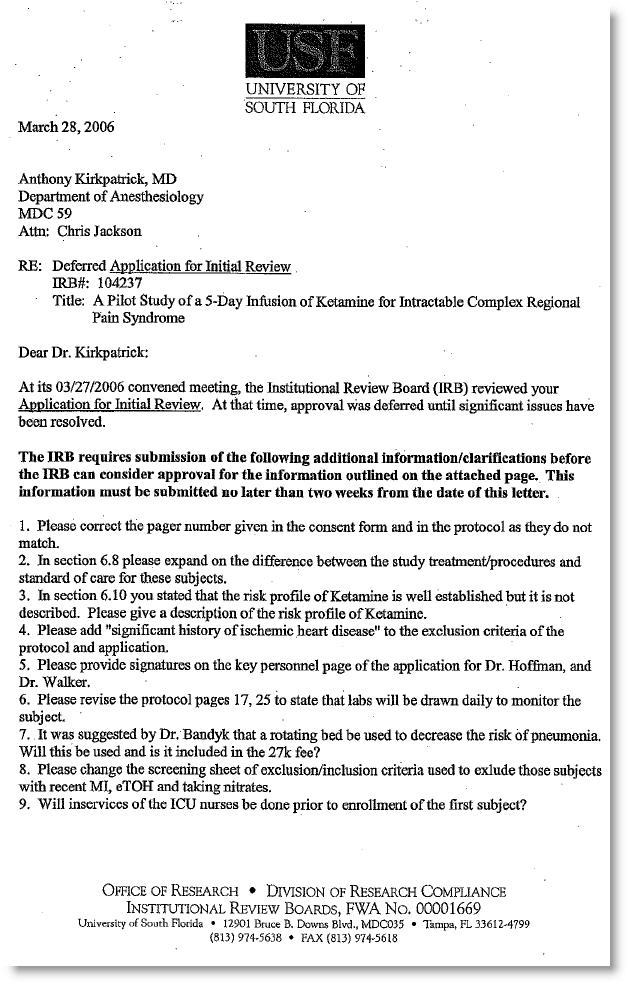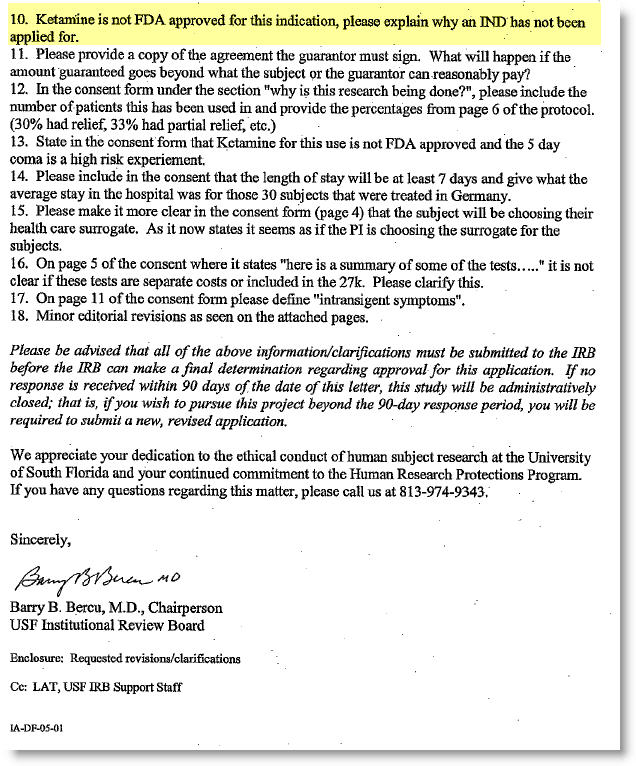March 27, 2006 IRB MEETING MINUTES The Vice-Chair, Dr. Sullivan, called the Institutional Review meeting to order on March 27, 2006 at 2:35 p.m. Kenneth Berg, B.S., Non-Affiliated, Non-scientist, Community member
Mortimer Brown, Ph.D., Non-Affiliated Cathie DeLuna, R.N., Tampa General Hospital, Nursing Linda Detman, Ph.D., USF Hiram Green, B.A. USF Non-scientist, Diversity/Community Affairs Nagi Kumar, Ph.D., USF, MCC, Nutrition Arzu Ilercil, MD, USF, TGH, Cardiology Richard Lush, Ph.D., USF, MCC, Pharmacology/therapeutics Pamela Munster, M.D., USF, MCC, Medical Oncology Jennifer Powe, RN, VA, Cardiothoracic Daniel Sullivan, M.D. USF, MCC, Medical oncology/biochemistry Barry Bercu, M.D., Chairperson, University of South Florida, Pediatrics
Ray Dielman, N.D., NA, Radiation Medicine, Natural Hygiene Clement Gwede, Ph.D., MPH, R.N., USF/Moffitt Cancer Center, Nursing/Health Outcomes John Merritt, M.D. FACP, USF, VA, Internal Medicine Norma Epley, Assistant Director, Division of Research Compliance, Ex-Officio
Patti Simmons, Manager, Research and Sponsored Projects, TGH, Ex-Officio Administrative Staff: Laurie A. Tozier; Henry Zych Guest(s): Jeff Jorski, MCC, Lori Barctel, TGH Approval of Minutes A motion was made to approve the January 23, 2006 minutes. The motion was and carried unanimously. The IRB voted For - 10 Against - 0 Abstain - 0 (Total present - 10) 104237 Kirkpatrick, Anthony A Pilot Study of a 5-Day Infusion of Ketamine for Intractable Complex Regional Pain Syndrome The reviewer presented the study. This study involves putting patients with chronic pain (CRPS) under 5 days of general anesthesia using the drug Ketamine in the ICU at Tampa General Hospital. There were multiple unresolved issues when this study was previously reviewed with the major issue being that the patients are required to provide $27,000 up front prior to enrolling. The reviewer stated that the PI did a lot of work on the revisions. However, he needs to correct the pager number on the consent as it does not match what is listed in the application. He should also expand on the difference in the standard of care versus this study treatment. The risk profile of Ketamine is not actually described only that it is well established. The PI revised the exclusion criteria but should also add significant history of cardiac ischemic disease to these criteria. The protocol and application also need to state that the labs for the study will be taken every day. There was a note included about the suggestion of using a rotating bed to decrease risk of pneumonia but it was not stated if it will actually be used so this needs to be clarified and will it be part of the $27,000 fee. Another issue was the ICU nurses titrating the ketamine and there was a question if the nurses would be getting in-services prior to the enrollment. It was not stated in the application. This is very important to the study and the nurses need to be given in-services training. [Tape #2A, 5 minutes] Since the drug ketamine is being used for a non-approved use does the PI need to apply for a IND? The PI should clarify this. The IRB requested that a copy of the guarantor agreement also be submitted. The reviewer also tried to call the finance department using the number listed in the consent form and could not get in touch with anyone. The PI also needs to include in the consent form the percentages of relief from pain that patients experienced in the German study. He should also state what the average length of stay for those subjects were in the German study. Clarification regarding who decides the health care surrogate for the patient is needed. The consent form indicates that the PI is assigning the surrogate instead of the patient themselves. The procedures of the study and what is covered by the $27,000 should be given in the consent form in more detail. The IRB had requested a review done by an outside clinician who is a pain doctor. Her overall point of view was that this study could be done at a lower dose of Ketamine that does not require general anesthesia for 5 days in the ICU and with less risk. There was further discussion regarding the study being very expensive for patients and would the patients have the means to pay, and if they do, how is this being just to other populations. It was stated that the patient will pay 35% of the hospital costs up to $70,000. Another point of view expressed that although this is very expensive to the patient how can they be denied the opportunity to be pain free even if they need to take out loans to pay for this. The Board would like the PI to provide a best case cost scenario and a worse case cost scenario so the subject is informed. The PI will also know what the costs will be after 1 patient has completed the study and he will be able to revise his information for the subsequent subjects. Although the German study is not published it is a well known study in the pain anesthesia field and the outside reviewer knew of the study immediately when it was mentioned. The Board requested that 2 other outside anesthesiologists review the study and give their opinions. One reviewer stated that there is possible potential for some good in this study but it is questionable whether the benefit outweighs the risk given the cost and risk of being under anesthesia for 5 days and all the possible complications that could occur. Given the situation of this study the PI needs to give extremely specific cost information and provide all the data in the consent form on the 30 patients that have been treated to date in Germany. He needs to address all the issues discussed today, the IRB will solicit the outside expert reviewers opinions. After review of these opinions, then maybe the study could enroll one patient. [Tape #2A, 26 minutes] A board member stated that even with outside reviewer's opinions the excessive cost and risk will not be diminished. Another Board member stated that, although this is true, an expert opinion can bring some valuable information to show this IRB that there is a reasonable benefit to the cost. The Committee had no further questions or discussion on this study. A motion was made to DEFER this study pending major revisions. The motion was seconded and carried unanimously. The IRB voted For - 8 Against - 2 Abstain - 0 (Total present - 10) [Tape #2A, 36 minutes, Tape ends] |



